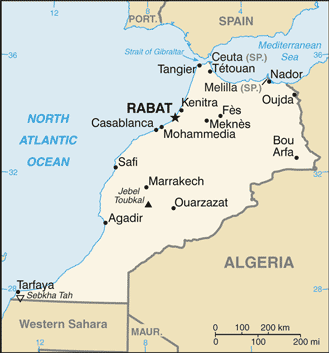Morocco
 The kingdom of Morocco has an estimated population of 33 million. The capital is Rabat. Morocco has a territorial area of 710,850 sq km (274,460 sq miles). The main language is Arabic.
The kingdom of Morocco has an estimated population of 33 million. The capital is Rabat. Morocco has a territorial area of 710,850 sq km (274,460 sq miles). The main language is Arabic.
Britain, Germany, France and Spain all had colonial interests in Morocco. However, in 1912 the Treaty of Fez effectively granted the southern region the Protectorate of France and the northern regions the Protectorate of Spain. Morocco gained its independence from both countries in 1956. While trying to unify the previous colonized country, the country faced several years of political unrest. Tension still remains on the southern border shared with the Western Sahara. Morocco withdrew its membership from the African Union (AU), because the union acknowledged and accepted membership from the state of Western Sahara. The country, however, has a special status with the AU.
Women have been fighting for equality in Morocco since the early 1980’s and have successfully achieved some legal reforms. Throughout the 1990’s steps were made protecting women from forced marriages, male guardianship, polygamy, and inheritance. It was not until 2004 that a new family code was created. This code guaranteed equality between men and women and is seen landmark for Morocco. Women can be seen holding high-level positions in government, communities, and religious sections. Because the implementation of the code has been met with resistance, its full effects on the country remain to be seen.
- Because the Kingdom of Morocco is not a member of the AU is has neither signer nor ratified the Protocol to the African Charter on Human and Peoples' Rights on the Rights of Women in Africa (The Maputo Protocol)
- The Kingdom of Morocco ratified the Convention on the Elimination of All Forms of Discrimination against Women on the 21st of June 1993.
- Morocco has not yet adopted a National Action Plan on United Nations Security Council Resolution 1325 (UNSCR 1325).
- There is a UN peacekeeping mandate in Western Sahara and Morocco: United Nations Missions for the Referendum in Western Sahara (MINURSO)
